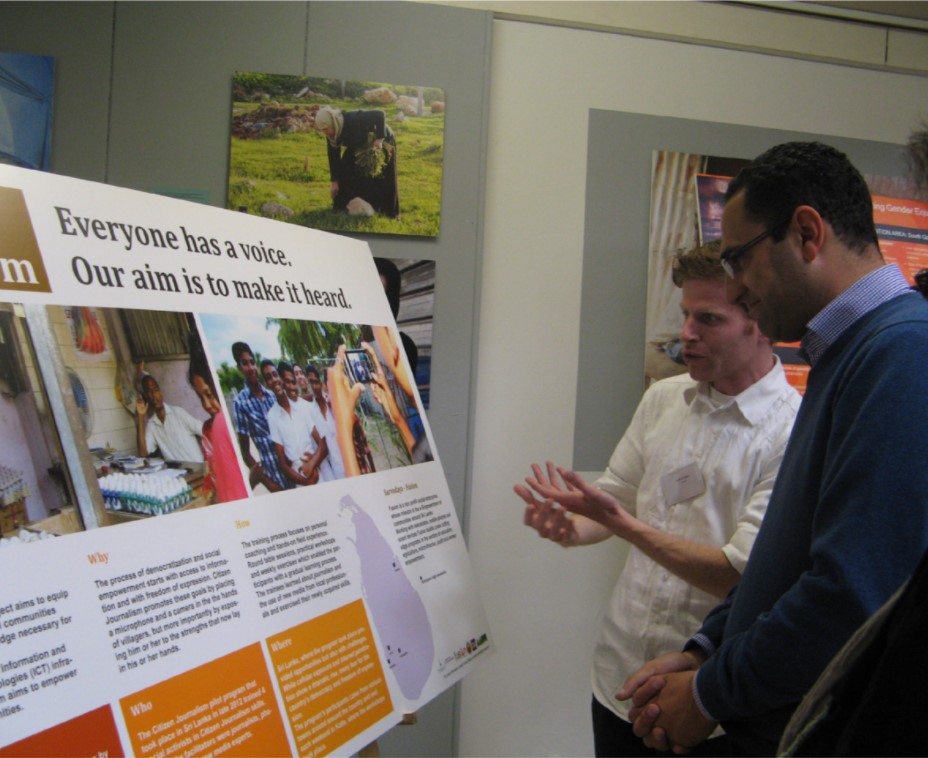
What's the connection between cooperatives in Uganda, women's health in Nepal and the use of Facebook in Sri Lanka? These and many other topics were among the issues that students from the Glocal program grappled with during their field internships which took place between September and December 2013. The students are part of the 2nd cohort of a new and unique program at the Hebrew university called "Glocal – Community-Development Studies".
Many global development issues were presented in the program's annual end of year conference that took place April 11th at the Hebrew University. As part of the event, students also presented a special photo exhibition named "Through Our Eyes" depicting remarkable scenes from their experiences during their four month internships around the world, in countries such as India, Kenya, Uganda, Tanzania, and Benin among others.
The opening was followed by moderated panels dealing with core development issues and rising dilemmas. "We don’t think we have all the answers, but we definitely have a lot of questions"' said one of participants. Ilan Flus, Director, Policy Planning & External Relations Dept of Israel's Agency for International Development Cooperation (MASHAV), said at the conference that, "the Glocal program is an important one because it deals with global issues with local voices. There are big challenges facing development today and the students are joining a global community that is growing also in Israel where more experts are getting involved. Opening the Glocal program is an achievement to the University".
Prof. Vered Vinitzky-Seroussi, the Dean of the Faculty of Social Sciences said that "The program represents our intension to not be just research oriented but also practice in Tikkun Olam. For this job you need to have social commitment but more important you need to have a soul. We can say that we owe it to the public to help the less fortunate than us, but first of all we owe it to ourselves". Avihai Stollar, one of the students who presented an academic poster as part of the event worked during his internship in Sarvodaya, an organization in Sri Lanka spearheading a Citizen Journalism project aimed at empowering local communities.
"The internet platform already exists there, and there is so much potential in the technology that can really change people's lives". So you want to change the world, in what ways? Avihai explains: "Social media today allows people to connect for a cause and provides the ability to demand that policymakers be accountable for their actions. For example, if in a village in rural Sri Lanka people want to fix the road leading to their village they can use Facebook to raise the demand to fix the road. It gives the opportunity to people to raise their voice and be creative. If they make enough noise they can't be ignored".
Gaining a new perspective:
The conference was also a platform for students to exchange ideas and thoughts with other development practitioners from all around the world. Betewulign Adem, an agriculture teacher from Jimma University in Ethiopia attended the conference as one of the participants of a program at the the Weitz Center for Development Studies in Rehovot, Israel. "I think it's important to learn from other people's experience and ideas and you never know who you can meet that will open a new door you did not know exist before," reflected Adem. "I want to learn about the way Israeli do things in agriculture. You have a lot of technology that we can learn from, things we are not familiar with".
What can Israelis learn from you?
"I think collaboration could benefit both Israelis and Ethiopians since we have bio diversity which doesn’t exist here, so with the right collaboration we could only grow stronger," said Adem. As the worker in the health ministry in South Sudan, Betty Eyobo takes part in fascinating state building in the young country. "When I traveled here I saw that you guys have so much desert and mountains but when you go to the market there is all the variety of food. Literally, there's everything. Where I come from, the land is flat and fertile and still people are hungry. We have so many water sources but people don’t have water in their homes. This is what we need to change in order to survive".
Another Glocal student, Anne Sophie Cardinal, spoke in one of the panels titled "Human rights and migration: From vulnerability to empowerment" sharing her experiences working with CARE Benin in flood affected areas, and dealing with the displacement of thousands of people. She was surprised to discover that there could also be positive outcomes to such a disaster. What surprised you? I met a woman called Salamatu who was 50 years old. When we visited her village after the floods she told me: 'I lost everything I owned. I am thankful to be alive, and all I have left is my soul. I hope that my community will be able to rebuild itself soon and start over. If the men decide to go back and build in the old location, we women will not agree.” "I was amazed. It made me see how disasters sometimes turn out to be opportunities for change within communities". The event was also dedicated to say goodbye to the Academic Head of the program Prof. Steve Kaplan, who is leaving for his sabbatical year. Kaplan congratulated the students for their achievements.
Later, when asked what his advice was for his students past, present and future he said, "My best advice is to plan and plan and then be ready to change everything"
Liat Schlesinger


